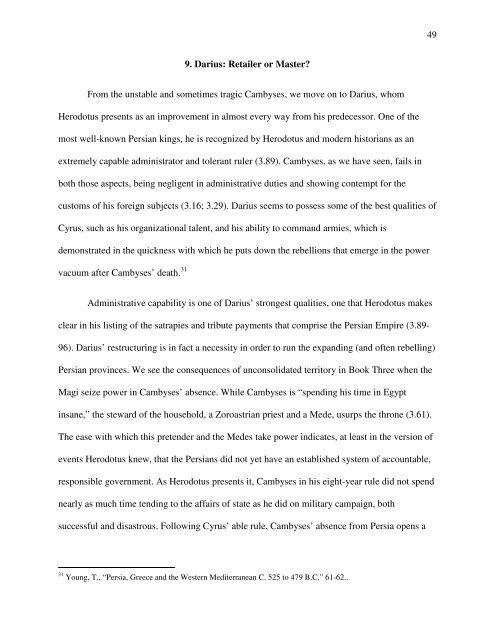The Old and the Restless - The Egyptians and the Scythians in Herodotus' Histories by Robert J. Hagan
You also want an ePaper? Increase the reach of your titles
YUMPU automatically turns print PDFs into web optimized ePapers that Google loves.
49<br />
9. Darius: Retailer or Master?<br />
From <strong>the</strong> unstable <strong>and</strong> sometimes tragic Cam<strong>by</strong>ses, we move on to Darius, whom<br />
Herodotus presents as an improvement <strong>in</strong> almost every way from his predecessor. One of <strong>the</strong><br />
most well-known Persian k<strong>in</strong>gs, he is recognized <strong>by</strong> Herodotus <strong>and</strong> modern historians as an<br />
extremely capable adm<strong>in</strong>istrator <strong>and</strong> tolerant ruler (3.89). Cam<strong>by</strong>ses, as we have seen, fails <strong>in</strong><br />
both those aspects, be<strong>in</strong>g negligent <strong>in</strong> adm<strong>in</strong>istrative duties <strong>and</strong> show<strong>in</strong>g contempt for <strong>the</strong><br />
customs of his foreign subjects (3.16; 3.29). Darius seems to possess some of <strong>the</strong> best qualities of<br />
Cyrus, such as his organizational talent, <strong>and</strong> his ability to comm<strong>and</strong> armies, which is<br />
demonstrated <strong>in</strong> <strong>the</strong> quickness with which he puts down <strong>the</strong> rebellions that emerge <strong>in</strong> <strong>the</strong> power<br />
vacuum after Cam<strong>by</strong>ses’ death. 31<br />
Adm<strong>in</strong>istrative capability is one of Darius’ strongest qualities, one that Herodotus makes<br />
clear <strong>in</strong> his list<strong>in</strong>g of <strong>the</strong> satrapies <strong>and</strong> tribute payments that comprise <strong>the</strong> Persian Empire (3.89-<br />
96). Darius’ restructur<strong>in</strong>g is <strong>in</strong> fact a necessity <strong>in</strong> order to run <strong>the</strong> exp<strong>and</strong><strong>in</strong>g (<strong>and</strong> often rebell<strong>in</strong>g)<br />
Persian prov<strong>in</strong>ces. We see <strong>the</strong> consequences of unconsolidated territory <strong>in</strong> Book Three when <strong>the</strong><br />
Magi seize power <strong>in</strong> Cam<strong>by</strong>ses’ absence. While Cam<strong>by</strong>ses is “spend<strong>in</strong>g his time <strong>in</strong> Egypt<br />
<strong>in</strong>sane,” <strong>the</strong> steward of <strong>the</strong> household, a Zoroastrian priest <strong>and</strong> a Mede, usurps <strong>the</strong> throne (3.61).<br />
<strong>The</strong> ease with which this pretender <strong>and</strong> <strong>the</strong> Medes take power <strong>in</strong>dicates, at least <strong>in</strong> <strong>the</strong> version of<br />
events Herodotus knew, that <strong>the</strong> Persians did not yet have an established system of accountable,<br />
responsible government. As Herodotus presents it, Cam<strong>by</strong>ses <strong>in</strong> his eight-year rule did not spend<br />
nearly as much time tend<strong>in</strong>g to <strong>the</strong> affairs of state as he did on military campaign, both<br />
successful <strong>and</strong> disastrous. Follow<strong>in</strong>g Cyrus’ able rule, Cam<strong>by</strong>ses’ absence from Persia opens a<br />
31 Young, T., “Persia, Greece <strong>and</strong> <strong>the</strong> Western Mediterranean C. 525 to 479 B.C.” 61-62..
















